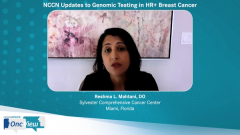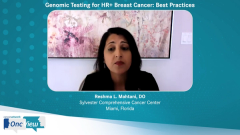
Extended Adjuvant Therapy for HR+ Breast Cancer
The rationale for treating early-stage HR+ breast cancer with extended adjuvant therapy and factors that impact treatment selection.
Episodes in this series

Kristie Kahl: Hi, and welcome to this CancerNetwork® OncView program titled “Individualizing Extended Adjuvant Therapy in HR+ Breast Cancer.” Our discussion is going to focus on adjuvant therapy in hormone receptor–positive breast cancer. Dr Mahtani, what are the options for extended adjuvant therapy in patients with early stage hormone receptor–positive breast cancer?
Reshma L. Mahtani, DO: We should start by defining extended adjuvant hormonal therapy for women with early stage breast cancer as indicated in those who have completed 5 years of tamoxifen, or a sequence of tamoxifen and an aromatase inhibitor. There’s an option to continue on with additional endocrine therapy, typically for an additional 5 years. The idea in considering additional treatment is that, for some patients, the risk of recurrence continues well beyond the 5 years postdiagnosis. Given that many recurrences occur after 5 years, it may be useful to consider extended therapy for some patients. The trials that have evaluated additional therapy after those first 5 years have consistently shown about a 3% to 5% absolute benefit in preventing recurrences. However, this benefit should be balanced against the toxicities that many women who are on extended endocrine therapy face. We typically decide whether to extend the therapy based on clinical pathological features, such as nodal status and tumor size. This information can certainly be prognostic, but the challenge is that it’s not always predictive in terms of who’s going to benefit. That’s where we really need an additional piece of information.
Transcript edited for clarity.
Newsletter
Stay up to date on recent advances in the multidisciplinary approach to cancer.










































